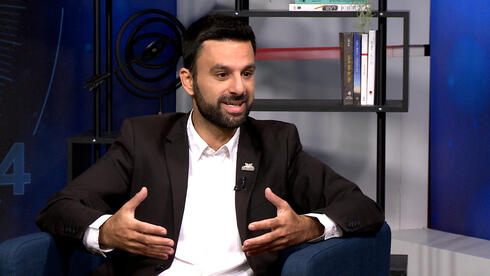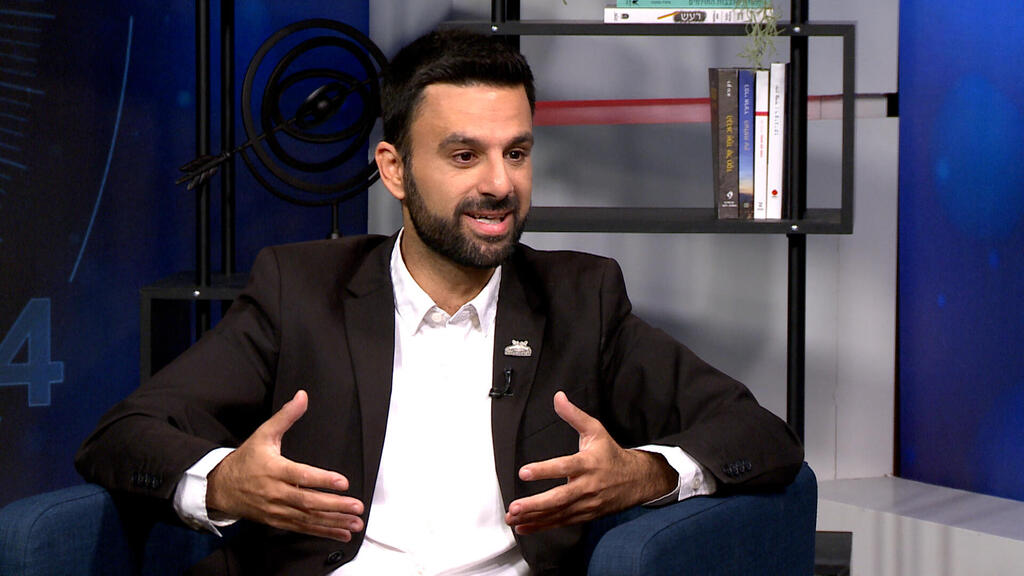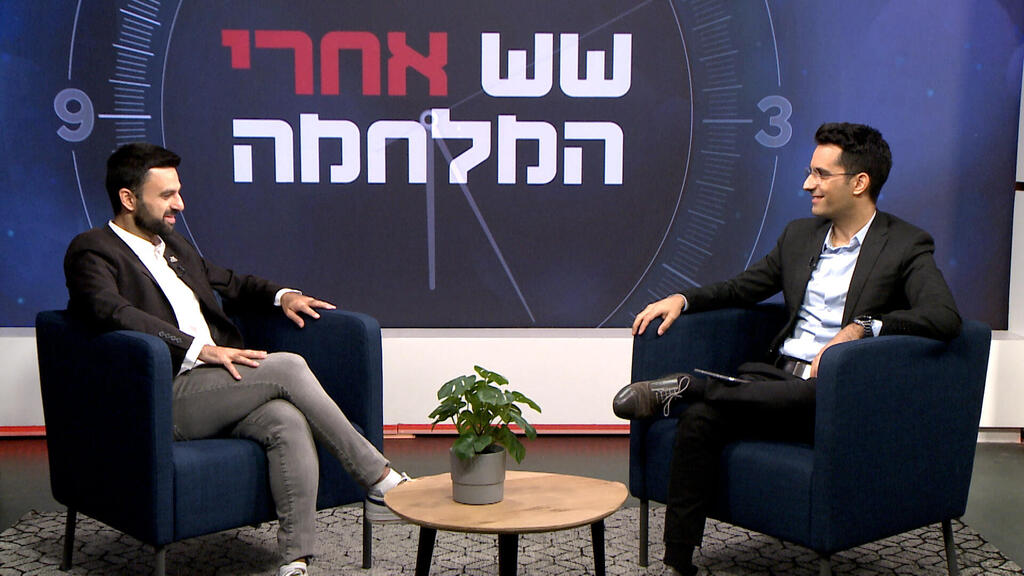
Six After War
Yoseph Haddad: "As an Israeli Arab, I bring all the angles - that’s why people connect to my content"
"Advocacy gives the IDF soldiers breathing room for their activities," Yoseph Haddad, advocacy activist and CEO of "Together - Vouch for Each Other", said as part of Calcalist and Poalim Tech's series of online interviews "Six After War"
"There is no doubt that since October 7, the activities in the field of advocacy have increased more than usual and this is our mission right now," Yoseph Haddad, advocacy activist and CEO of "Together - Vouch for Each Other", told Calcalist's Maor Shalom Swisa during Calcalist and Poalim Tech’s "Six After the War" series of online interviews.
Haddad, who is currently working around the clock both on social networks and outside of them in order to strengthen Israeli advocacy in Israel and around the world, refers to the events of October 7 and says: "We saw in the first weeks that all of Israeli society did their part in the advocacy, and this is important because people do not perceive that the operational and ground activity is, among other things, a derivative of Israeli diplomacy. We are providing breathing room for the IDF soldiers and their activities, adding grains to the hourglass so that it is possible to fight, and these grains are critical."
How did you as an Israeli Arab become one of the most eloquent and influential speakers for the State of Israel?
"As an Israeli Arab, one of the reasons people connect to my content is because I bring all the angles - what is happening in the Arab media and the lies they spread, how the Western media covers it, what they say on CNN and how the BBC lies. Anyone who thinks that we don't need advocacy for Israelis is wrong, quite the contrary.
"The very fact that I manage to bring Israeli advocacy to the Israeli audience, and also to the Arab audience and the Western audience has made it much more accessible. I do it in three languages—Arabic, Hebrew, and English—and thanks to AI, I also succeed in French and Spanish so that we can reach everyone. I'm just the face, but behind me are dozens of Israeli Arabs of all denominations who monitor information, translate and edit. Israeli diplomacy is done by Christian Arabs, Muslims and Druze."
You do the outreach at your own expense and it is quite costly.
"When you do Israeli advocacy, certainly after the events of October 7, you don't really think about money. I don't get any support from the government and the only support comes from private individuals. We even have a 15-year-old donor from Sakhnin who donates 50 shekels every month to the association from his own pocket money. I wrote to him that the real contribution is that he believes in us and this is the best thing he can do for us."
Why doesn't the state give money for advocacy?
"Money is not the main thing, I make a decent living from the I24 NEWS channel where I work and I also receive some disability allowance because I was injured in my military service in the IDF. There were quite a few offers, but the bottom line was that no offer allowed me to give my 100 percent and my truth. In one of the meetings, the question of cooperation came up, and at the end I asked who needs to approve my posts. I expected them to say that I had freedom to post, and as soon as they said that I needed to confirm it with someone, for me the conversation was over. I will not let anyone dictate to me what to upload, when to upload and how to upload, otherwise all the trust I have built between myself and my followers is worthless."
When you as an Israeli Arab come and say to all of those who denounce the State of Israel and believe that there is an occupation here, that you live a free and liberal life in Israel, maybe that should end the debate?
"Yes and no. 'Together - Vouch for Each Other’' is an Israeli Arab association that deals, among other things, with connecting Israeli Arab society and bridging the gaps between Jews and Arabs. Among other things, we also deal with Israeli advocacy. In one of the delegations we sent to the United States, there were Israeli Arab women and men, and we purposely wrote something vague on the publicity leaflet for the panel: The Arabs in Israel are coming to talk about Israel. There was an unprecedented turnout of anti-Israelis who thought that if Arabs are coming they will talk about Free Palestine, and they got the shock of a lifetime. We were five panelists and there was a mixed audience, also including those who are on the fence and whom I am addressing. Of course, there are the pro-Israelis whom I am also speaking to, because I want to give them tools and strengthen them. They are at the forefront of the Diaspora."
How did the anti-Israeli attendees react?
"There were two types of reactions: Either total shock or the reaction I expected: 'You receive money, you are a traitor, you are a collaborator of the Zionists.' They don't understand that they are only doing us a good service because I don't expect in a one-hour panel to change the opinion of an anti-Israeli, but I can undermine it. Whose mind do I expect to change? The group that sits on the fence. When they see how the anti-Israel group cancels my voice because it is different from theirs, it affects them in our favor."
An Arab from the north started the process of enlisting in the army and a group of people came to his parents' house and threatened him and he gave up. Arab society is very closed and has violence. How can it be changed?
"There is an ability to change, but there must be a will. It takes two to tango. Obviously, there is a responsibility of the State of Israel, but there is also a responsibility of our leaders within the Arab society, and here there was a serious failure. Can you point to one achievement of the politicians from the Arab society in the last 20 years? No. So it is definitely possible to change and we are starting to do it.
"A few days ago, a survey by the Moshe Dayan Center for the Study of the Middle East and Africa at Tel Aviv University was published, in which the question was asked: what is the dominant identity among Israeli Arabs? The Israeli identity prevailed over the Arab identity with 33% compared to 32%, while the Palestinian identity dropped to 8%. The survey shows that there is a desire within Israeli Arab society to be part of Israeli society and our role and my role, as someone who sees himself as a leader within Arab society, is to support that guy who wanted to enlist in the army but was afraid of those extremists. The majority stopped being afraid and have support. Many Israeli Arabs have told me that as a result of our association, they have a roof under which they feel more secure and that they want to serve in the army or national service."
Why isn't this happening in bigger numbers?
"You’re wrong, it is happening. Ten years ago, about 200 Israeli Arabs volunteered for national service each year. Today, 5,000-6,000 Israeli Arabs volunteer every year and make up about 28% of those doing national service. Most Israeli Arabs want to be an integral part of Israeli society."
So will we see a Yoseph Haddad political party or not?
"We are at war today. What I would have said before October 7 is that when the time is right and on the day I see that I can really have more of an impact on the political arena, I would not hesitate to join the political arena, even with a new party. Until we end the war, return all those kidnapped and destroy Hamas, there is nothing to talk about. Now it is not relevant."
Since October 7, many conceptions have been broken. How about for you?
"The concept we have lived with for years is regarding our relationship with the terrorist organization Hamas. I shouted it out. On October 7th we received the stamp of confirmation that I was right when I said that so long that we postpone the end and do not deal with Hamas, we will pay a dear price and with compound interest. I hate to say that I was right. If we look at Israeli society as a whole, I see ultra-Orthodox and religious and secular, left-wing and right-wing, Arabs and Jews, mostly united to protect this country. Those who changed their conception are people who lived in illusions, and I don't live in an illusion, I have the facts and the truth, and therefore my world hasn't changed at all and it will continue exactly as it is."
















